- Home
- Brian Keene
Tequila's Sunrise Page 6
Tequila's Sunrise Read online
Page 6
“Dallas?”
There was no answer. She knelt to the floor and scooped the ash in her hands, letting it sift through her fingers. Another gust of wind blew through the room, gently carrying the dust away.
“I miss you.”
She went back out into the hall and knocked on Doris’ door.
“All set dear?”
“If it’s okay with you, Doris, I think I’m going to hang around awhile.”
“I understand, Laura. Take what time you need. It’s important to do so. I’ll be off for the hospital then. Jack will be grumbling if I don’t get back soon.”
“Give him my best?”
“I surely will. And you must come see him soon, yes?”
Laura nodded, unable to speak.
She went back to her apartment and shut the door, waiting for the sounds of the old lady’s departure. When she was sure Doris had gone, she rummaged inside her shopping bag and pulled out the gas can and the pills. She swallowed the pills first, and waited for them to kick in. Then, as she grew drowsy, Laura unscrewed the lid and splashed gasoline all over the floor, the walls, and the furniture. It carved little rivulets in the dust, and the smell of it wasn’t at all unpleasant. It was welcome. The odor blocked out the stench coming from the pit below.
She was getting sleepy.
Laura lit the match.
“Dallas.”
The wind answered her with a sigh, and the dust began to move again, caressing her arms and face.
She was asleep before the flames touched her.
***
The fireman wiped a grimy hand across his brow. “Christ, like we needed this on top of everything else?”
“Least the building wasn’t re-occupied yet,” his partner said. “And the fire was contained to just a few apartments.”
“Wasn’t re-occupied my ass! What do you call those? Squatters?” He pointed at the two mounds of dust on the floor. They were both human shaped, lying together side-by-side. He let his eyes linger on them a moment longer, and swore that the dust piles were holding hands.
The other man shrugged. “Optical illusion? A joke? Fuck, do you know how hot it had to be in here to reduce a human body to ash like that? Couldn’t have happened, man, or else this entire building would be toast.”
“So what the fuck are they?”
“Just one of those weird things, like the photos you see in The Fortean Times. Simulacra they call it, or something like that. The security guard said there were only a few tenants that had come back to get their stuff, and he was pretty sure they were gone.”
“Well, it still gives me the creeps. Let’s go.”
***
After they left, the dust began to swirl again. Sheets of heavy plywood had finally been put into place, sealing up the burned apartment, but the air moved. A wind blew through the room. It came not from the windows or from the hall, but from somewhere else.
The mounds of ash rose and embraced. Then, still holding hands, they fell apart; floating away until there was nothing left.
***
***
***
This story appeared in my second short-story collection, Fear of Gravity, and was reprinted in A Little Silver Book of Streetwise Stories and as a promotional chapbook (along with a story by author Kelli Owen). All three are out-of-print.
“Dust” bounced around in my head for a year before I wrote it. One month after the 9/11 attacks, I went to New York City to do a live appearance at the Housing Works Bookstore. As I was walking down the street, I happened to glance up and spotted a turkey buzzard flying between the buildings. Then another. And another. Turkey buzzards are a common sight in rural areas like the town I grew up in. Any time there’s a dead animal in the field or on the road, you’ll find them circling. But I’d never seen one in the city. Especially New York City. A newspaper vendor told me the birds were going to Ground Zero—the wreckage of the World Trade Center. In some ways, that image of the scavenger birds, and the newspaper vendor’s explanation for their presence, chill me more than the footage of the planes hitting the towers or the Pentagon ever can. A year after, in October of 2002, I tired to write it out of my system. “Dust” was the result.
FADE TO NULL
She woke to the sound of thunder, lying in a strange bed with no memory of who she was or where she was, and panic nearly overwhelmed her. Her stomach clenched. Her breaths came in short gasps. Frantic, she glanced around the room for clues, but familiarity eluded her. The room was small, equipped with a dresser, a writing desk, and a chair with one leg shorter than the others. Atop the dresser sat a slender blue-glass vase with some flowers in it.
The flowers soothed her, but she didn’t know why.
She studied the rest of the room. Looming overhead were the cracked, yellowing panels of a drop ceiling. The carpet was light green, the wallpaper pastel. Framed prints hung on the wall—Monet, Kincaid, Rockwell. She wondered how it was possible that she knew their names but didn’t know her own. The closet door was slightly open, revealing a stranger’s clothes. There was only one window, and the blinds were closed tight. If the room had a door, other than the closet, she couldn’t see it.
The sheets were thin and starchy, and rubbed against her skin like sandpaper. They felt damp from sweat. Clenching the sheets in both fists, she raised them slightly and peered beneath. She was dressed in a faded sleeping gown with a dried brown stain over one breast. What was it? Gravy? Mud? Blood? Except for her underwear, she was bare beneath the gown.
She considered calling for help, but decided against it. She was afraid—afraid of who, or what, might answer her summons. Despite the fact that the room seemed empty, she couldn’t help but feel like there was someone else in here with her. Someone unseen.
The thunder boomed again. Blue-white light flashed from behind the closed blinds, and for a moment, she saw glimpses of other people in the room with her—a man, a woman, and a little girl. They were like the images on photo negatives, stark against the room’s feeble light, but at the same time, flickering and ghostly—composed of television static. The man stood by her bedside, dressed in a white doctor’s coat. A stethoscope dangled around his neck. He held a clipboard. The woman stood next to him, wearing a simple but pretty blouse. She seemed tired and sad. The little girl sat in the wobbly chair, rocking back and forth on the crooked legs.
“It’s okay, Mika. Grandma is just having a bad dream.”
The voice was distant. Muted. An echo. And female.
She tried to scream, but only managed a rasping, wheezy sigh.
The three figures vanished with the next blast of thunder, blinking out of existence as if they’d never been there at all.
Maybe they hadn’t.
She was dimly aware that she had to pee.
When the drum roll of thunder sounded again, the drop-ceiling disappeared as quickly as the ghost-people had. Everything else in the room remained the same—the drab furnishings, the dim light—but in the ceiling’s place was a purple, wounded sky. Boiling clouds raced across it, but she felt no wind. Although the temperature hadn’t changed, she shivered. The pressure on her bladder increased. She relaxed, and felt a sudden rush of warmth. Then the violet sky split open, revealing a black hole, and it began to rain desiccated flowers.
‘Flowers,’ she thought. ‘There are flowers on the dresser. Ellen brought them.’
Then she wondered who Ellen was.
Dried petals continued to shower the bed, tickling her nose and cheeks. She sighed. The feeling was not unpleasant. Then, as quickly as it had begun, the rain of flower petals stopped—replaced by something else. Her eyes widened in terror. A squadron of bulbous flies poured from the hole in the sky, buzzing in a multitude of languages. Their bodies were black, their heads green like emeralds. They circled the room in a swirling pattern. A flock of birds plunged out of the hole, giving chase. The thunder increased, inside the room with her now. The noise was deafening. The flies scattered and the birds squawked in f
right. A black, oily feather floated gently towards her.
She tried to sit up, but her fatigue weighed her like a stone. All she could do was lie there and watch. Listen. Wonder.
Where was she? What was this? What was happening?
She thought again of the flowers. They’d been brought by... who, exactly? She couldn’t remember. Someone. She thought it might be important.
The warmth dissipated. She was cold again. Her fear was replaced by a powerful sense of frustration in both her physical discomfort and her confusion. Why couldn’t she remember anything?
Above her, the sky continued to weep. Now, strands of DNA fell in ribbons, forming puddles on the bed and floor. Life stirred within those puddles, writhing and squirming. The thunder changed into a voice—a deity, perhaps, screaming. It was a terrible sound. She clasped her hands over her ears and tried to block it out. She’d heard screams like this before. Perhaps she’d even made them, at one time. They sounded like the symphony of birthing pains.
A large puddle of liquid tissue had formed on the sheet in front of her, right between her legs. As she watched, something wriggled from the puddle—a one-inch tentacle, about the thickness of a pencil. There was an eyeball attached to one end of the tendril. It stared at her, and as she watched, the pupil dilated.
In the background, the deity was still screaming. She no longer cared. Her attention was focused on the tentacle-thing. The creature groped feebly at her gown, and then pulled itself forward. She slapped her hand down on it, pressing it into the mattress and grinding her palm back and forth. The tentacle squeaked—even though it lacked a mouth—and then lay still. She removed her hand. All that remained of the thing was a pinkish-white blob of mucus. Slime dripped from her hand.
Silence returned. The disembodied screaming stopped. So did the thunder. The flies and the birds turned to vapor. The hole in the sky closed up, and second later, the drop ceiling reappeared.
“Please,” she whispered. “Please... please...”
Then, new voices spoke. A man and a woman.
“She used to love to paint. I thought bringing some of this might help, but she can’t even hold the paintbrush.”
“Yes. Her motor skills are decreasing rapidly.”
“How long does she have?”
“In this stage of Alzheimer’s, it is difficult to say. I’ve seen some hang on for years after the fourth stage has set in. Others go quickly. All we can do is keep her comfortable.”
“I just hate bringing Mika to see her like this, you know? I’m worried about how it will effect her.”
“That’s understandable, Ellen. And while some studies suggest that it’s beneficial for patients, we can’t even really be sure that your mother is aware of the presence of those around her. I know it’s not much comfort, but at least she’s calm and peaceful, for the most part.”
“Who are you?” she moaned. “Where are you?”
She closed her eyes and let her cheek loll against the pillow, wishing the sky would rain flowers again.
“Who am I?” she whispered. “Please...”
The voices disappeared.
At last, she slept.
When she awoke again, the room was dark and cold. She shivered. There were flowers on the dresser, but she no longer knew what they were.
***
***
This story started as nothing more than a fragment. About one-hundred words of it was originally written for one of those multi-author collaboration projects—two dozen authors each contributing to one short story. Unfortunately, the project never came to fruition. I no longer remember who was involved or what the premise was. All I know is that it was never published (if it had been, I’m sure I’d have a contract or a copy of the book around here somewhere).
Anyway, I bought a new computer and I was in the process of transferring my files over to it when I ran across this old, forgotten fragment. I re-worked it into this story. Alzheimer’s has impacted my family in a very personal way. It’s a truly terrifying disease. I find it especially scary because none of us really know what’s going on inside the mind of the victim.
“Fade To Null” has only appeared once before—in my now out-of-print short story collection Unhappy Endings.
BUNNIES IN AUGUST
One year later…
He shouldn’t have come here. Not today. Especially not today.
This is where it happened, he thought. This is where Jack died.
Gary stood beneath the water tower. It perched atop the tallest hill in town, right between the Methodist church cemetery, and the rear of the tiny, decrepit strip mall (abandoned when Wal-Mart moved in two miles away), and a corn field. The tower was a massive, looming, blue thing, providing water to the populace below. Every time he saw it, (which was all the time, because it was visible from everywhere in town) Gary was reminded of the Martian tripods from War of the Worlds. When Jack was old enough to read the graphic novel adaptation, it had reminded him of the same thing.
“It looks like one of the Martian robots, doesn’t it Daddy? Doesn’t it? Let’s pretend the Martians are invading!”
The first tear welled up. Then another. They built to a crescendo. Surrendering, Gary closed his eyes and wept. A warm summer breeze rustled the treetops above him. His breath caught in his throat. He tried to swallow the lump, and found he couldn’t. Sweat beaded his forehead. The heat was stifling. His skin prickled, as if on fire. As if he was burning. The wind brushed against him like caressing flames.
Blinking the tears away, he glanced back up at the water tower and wondered how he could bring it down. He saw it every day—on the drive home, from the grocery store parking lot, the backyard, even his bedroom window—and each time he was reminded of his son. The tower’s presence was inescapable. How to erase its existence—and thus, the memories? A chainsaw was out of the question. The supports were made of steel. Explosives maybe? Yeah. Sure. He was a fucking insurance salesman. Where was he going to find explosives?
He hated the water tower. It stood here as an unwanted reminder, a dark monument to Jack.
This was where it happened.
This used to be their playground.
Weekends had always been their time together. During the week, Gary and Susan both worked, he at the insurance office and she from home, typing up tape-recorded court transcripts. Jack had school, fourth grade, where he excelled in English and Social Studies, but struggled with Math and Science. Gary didn’t see them much on weeknights, either. He’d had other… obligations.
Leila’s face popped into his mind, unbidden. He pushed her away.
Get thee behind me, Satan.
The weekends were magic. Once he’d waded through the mind-numbing tedium of domestic chores; grocery shopping, mowing the lawn, cleaning the gutters, and anything else Susan thought up for him to do while she sat at home all day long; after all that, there was Daddy and Jack time. Father and son time. Quality time.
Jack’s first word had been ‘Da-da’.
Gary had loved his son. Loved him so much that it hurt, sometimes. Despite how clichéd it may have sounded to some people, the pain was real. And good. When Jack was little, Gary used to stand over his crib and watch him sleeping. In those moments, Gary’s breath hitched up in his chest—a powerful, overwhelming emotional wave. He’d loved Susan like that too, once upon a time, when they’d first been married. Before job-related stress and mortgage payments and their mutual weight gain—and before Susan’s little personality quirks, things he’d thought were cute and endearing when he’d first met her, the very things he’d fallen in love with after the initial physical attraction, became annoying rather than charming. They knew everything there was to know about each other, and thus, they knew too much. Boredom set in, and worse, a simmering complacency that hollowed him out inside and left him empty. When Jack came along in their fifth year of marriage, Gary fell in love all over again, and his son had filled that hole.
At least temporarily…
&
nbsp; Parental love was one thing. That completed a part of him. But Gary still had unfulfilled needs. Needs that Susan didn’t seem inclined to acknowledge, and in truth, needs he wasn’t sure she could have satisfied any longer even if she’d shown interest. Not with the distance between them, a gulf that had grown wider after Jack’s birth. There were too many sleepless nights and grumpy mornings, too many laconic, grunted conversations in front of the television and not enough talking.
So Gary had gone elsewhere.
To Leila.
A crow called out above him, perched on a tree limb. The sound startled him, bringing Gary back to the present. The bird spread its wings and the branch bent under its wings. The leaves rustled as it took flight. Gary watched it go. His spirits plummeted even farther as the bird soared higher.
He stepped out from underneath the water tower’s shadow, back into the sunlight, and shivered.
We beat the Martians, Daddy! Me and you, together…
“Oh Jack,” he whispered, “I’m so sorry.”
Gary felt eyes upon him, a tickling sensation between his shoulder blades. He glanced around. Through his tears, he noticed a rabbit at the edge of the field, watching him intently.
He sniffed, wiping his nose with the back of his hand.
The rabbit twitched its whiskers and kept staring. Gary felt its black eyes bore into him. He wondered if animals blinked.
The rabbit didn’t.
“Scat.” Gary stamped his foot. “Go on! Get out of here.”
The rabbit scurried into the corn, vanishing as quickly as it had appeared. Gary studied the patch of grass where it had been sitting. The spot was empty, except for a large rock. Was it his imagination, or was the stone’s surface red?
Maybe the animal was injured. Or dying.
His mind threatened to dredge up more of the past, and he bit his lip, drawing blood.
Gary checked the time on his cell phone. He’d been gone a long while. Susan would be worried. He shouldn’t have left her alone, especially on today, of all days. But she’d insisted that at least one of them should visit Jack’s grave. That was what had brought him here in the first place. He’d been drawn to the water tower without even thinking about it. Susan hadn’t come with him to the cemetery. Said she couldn’t bear it. She’d visited the grave many times over the past year, but not today. It had been left for Gary to do, and so he had.

 The Rising
The Rising Entombed
Entombed Take the Long Way Home
Take the Long Way Home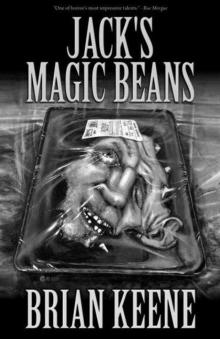 Jacks Magic Beans
Jacks Magic Beans Ghost Walk
Ghost Walk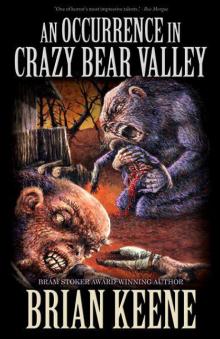 An Occurrence in Crazy Bear Valley
An Occurrence in Crazy Bear Valley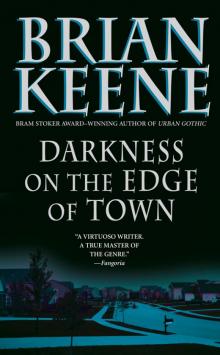 Darkness on the Edge of Town
Darkness on the Edge of Town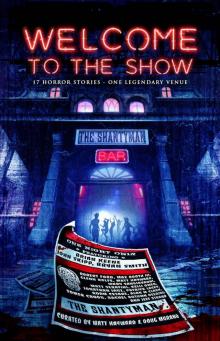 Welcome to the Show: 17 Horror Stories – One Legendary Venue
Welcome to the Show: 17 Horror Stories – One Legendary Venue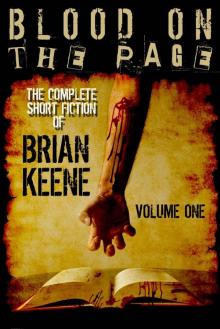 Blood on the Page: The Complete Short Fiction of Brian Keene, Volume 1
Blood on the Page: The Complete Short Fiction of Brian Keene, Volume 1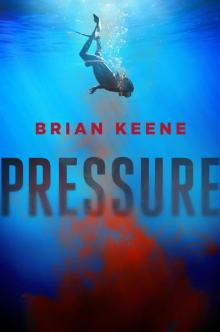 Pressure
Pressure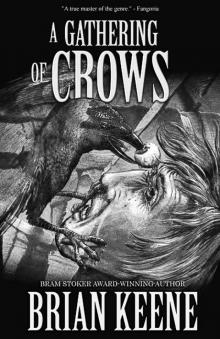 A Gathering of Crows
A Gathering of Crows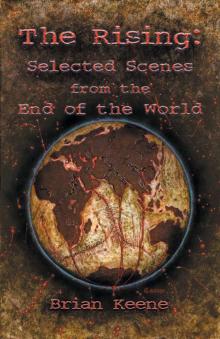 The Rising: Selected Scenes From the End of the World
The Rising: Selected Scenes From the End of the World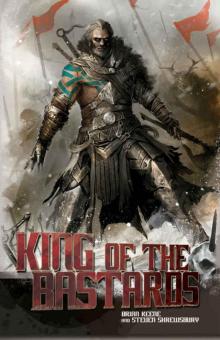 King of the Bastards
King of the Bastards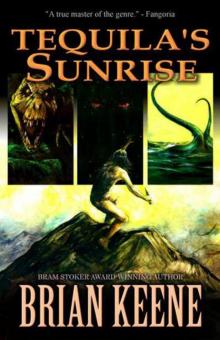 Tequila's Sunrise
Tequila's Sunrise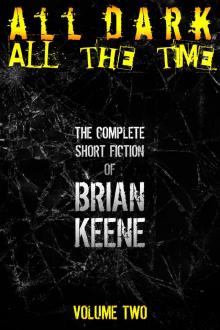 All Dark, All the Time
All Dark, All the Time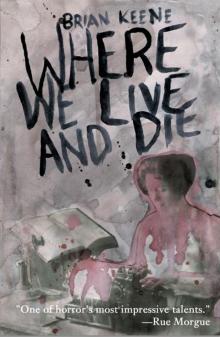 Where We Live and Die
Where We Live and Die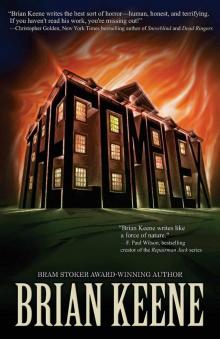 The Complex
The Complex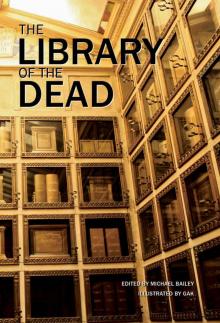 The Library of the Dead
The Library of the Dead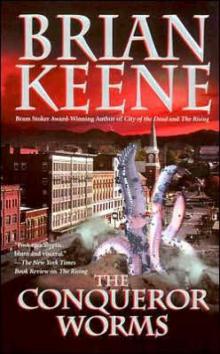 The Conqueror Worms
The Conqueror Worms The Girl on the Glider
The Girl on the Glider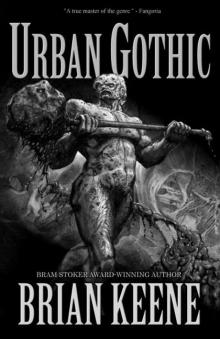 Urban Gothic
Urban Gothic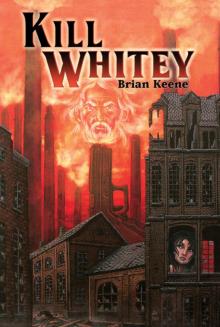 Kill Whitey
Kill Whitey Terminal
Terminal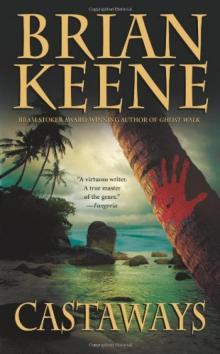 Castaways
Castaways